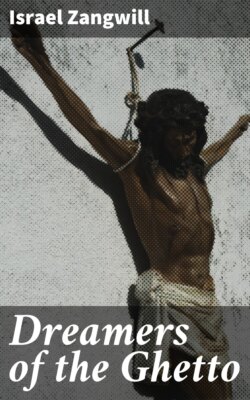Читать книгу Dreamers of the Ghetto - Israel Zangwill - Страница 26
На сайте Литреса книга снята с продажи.
III.
ОглавлениеA week later he heard in the town that Dom Diego de Balthasar had been arrested by the Inquisition for Judaism. The news brought him a more complex thrill than that shock of horror at the treacherous persistence of a pestilent heresy which it excited in the breast of his fellow-citizens. He recalled to mind now that there were thirty-four traces by which the bloodhounds of the Holy Office scented out the secret Jew, and that one of the tests ran: "If he celebrates the Passover by eating bitter herbs and lettuces." But the shudder which the thought of the Jew had once caused him was, to his own surprise, replaced by a secret sympathy. In his slowly-matured, self-evolved scepticism, he had forgotten that a whole race had remained Protestant from the first, rejecting at any and every cost the corner-stone of the Christian scheme. And this race—he remembered suddenly with a leap of the heart and a strange tingling of the blood—had once been his own! The knowledge that had lurked in the background of consciousness, like the exiled memory of an ancient shame, sprang up, strong and assertive. The far-off shadowy figures of those base-born ancestors of his who had prayed in the ancient synagogues in the days before the Great Expulsion, shook off the mists of a hundred years and stood forth solid, heroic, appealing.
And then recalling the dearth of bitter herbs in the market-place on what he now understood was the eve of Passover, he had a sudden intuition of a great secret brotherhood of the synagogue ramifying beneath all the outward life of Church and State; of a society honeycombed with Judaism that persisted tenaciously and eternally though persecution and expulsion, not in stray units, such as the Inquisition ferreted out, but in ineradicable communities. It was because the incautious physician had mistaken him for a member of the brotherhood of Israel that he had ventured upon his now transparent jests. "Good God!" thought Da Costa, sickening as he remembered the auto-da-fé he had seen at Lisbon in his boyhood, when De la Asunçao, the Franciscan Jew monk, clothed in the Sanbenito, was solemnly burnt in the presence of the king, the queen, the court, and the mob. "What if 'twas my tale to Frei José that led to Dom Diego's arrest! But no, that were surely evidence too trivial, and ambiguous at the best." And he put the painful suspicion aside and hastened to shut himself up in his study, sending down an excuse to his mother and brother by Pedro, the black slave-boy.
In the beautiful house on the hilltop, built by Gabriel's grandfather, and adorned with fine panelings and mosaics of many-colored woods from the Brazils, this study, secluded by its position at the head of the noble staircase, was not the least beautiful room. The floor and the walls were of rich-hued tiles, the arched ceiling was ribbed with polished woods to look like the scooped-out interior of a half-orange. Costly hangings muffled the noise of the outer world, and large shutters excluded, when necessary, the glare of the sun. The rays of Reason alone could not be shut out, and in this haunt of peace the young Catholic had known his bitterest hours of unrest. Here he now cast himself feverishly upon the perusal of the Old Testament, neglected by him, as by the Church.
"This book, at least, must be true," ran his tumultuous thoughts. "For this Testament do both creeds revere that wrangle over the later." He had a Latin text, and first he turned to the fifty-third chapter of Isaiah, and, reading it critically, he seemed to see that all these passages of prediction he had taken on trust as prognostications of a Redeemer might prophesy quite other and more intelligible things. And long past midnight he read among the Prophets, with flushed cheek and sparkling eye, as one drunk with new wine. What sublime truths, what aspirations after peace and justice, what trumpet-calls to righteousness!
He thrilled to the cry of Amos: "Take thou away from me the noise of thy songs, for I will not hear the melody of thy viols. But let judgment run down as waters, and righteousness as a mighty stream." And to the question of Micah: "What doth the Lord require of thee but to do justly and to love mercy and to walk humbly with thy God?" Ay, justice and mercy and humbleness—not paternosters and penances. He was melted to tears, he was exalted to the stars.
He turned to the Pentateuch and to the Laws of Moses, to the tender ordinances for the poor, the stranger, the beast. "Thou shalt love thy neighbor as thyself." "Thou shalt be unto me a holy people."
Why had his ancestors cut themselves off from this great people, whose creed was once so sublime and so simple? There had reached down to him some vague sense of the nameless tragedies of the Great Expulsion when these stiff-necked heretics were confronted with the choice of expatriation or conversion; but now he searched his book-shelves eagerly for some chronicle of those days of Torquemada. The native historians had little, but that little filled his imagination with horrid images of that second Exodus—famine, the plague, robbery, slaughter, the violation of virgins.
